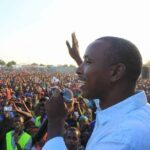Minds of the Movement
An ICNC blog on the people and power of civil resistance
by Abdourahman Mohamed Guelleh, "TX"October 14, 2020
This article was translated from the original French (here) by Amber French.
In our country, the traditional political opposition parties have always struggled to move the lines. Nothing changes under an authoritarian regime. Electoral fraud and possession of power by force—all-out repression, prison, torture, inhumane treatment, dismissal of hired officials, forced exile, deprivation of nationality, intimidation, threats, blackmail, assassinations—punctuate the daily life of nonviolent combatants for fundamental freedoms, democracy and the rule of law. The people are terrified and paralyzed by resignation, apathy and fear. This situation has been going on for decades in Djibouti, a small, French- and Arabic-speaking country in the Horn of Africa.
To face this harsh reality and desperation, our movement embraces nonviolent struggle as the one and only strategy of action against the authoritarian regime. This strategy abandons the political reflexes of traditional parties, which have not been effective in Djibouti for almost half a century. All of our energy, from thought to action, is directed towards nonviolent action.
In March 2018, the leader of the movement, self-taught in the field of nonviolent action through resources on ICNC's and CANVAS's websites, proposed an idea for a nonviolent action to the group: “a banner in a coffin.” The idea was to test the effectiveness of nonviolent action in the streets of the capital city of Djibouti, to perhaps eventually be able to endorse nonviolent action definitively. After all, great thinkers around the world had been touting, transmitting, and popularizing the strategy for centuries.
At the outset, the idea of a banner in a coffin seemed trivial to our group. But how the different phases of the planned action (design, objective, preparation, course of action) were explained intrigued activists. The idea hit the mark. Activists offered ideas for how to elaborate upon the idea for a much more dramatic effect (that is, exhibiting it in a mosque and in front of worshipers). However, these ideas were quickly abandoned so as not to risk shocking public opinion. Finally, a more mellow script was prepared to hopefully strike the right balance between humor and scandal.
The plan is put into action
This nonviolent action was quite simple. The only materials needed were a coffin, a 1.5-meter-long cardboard box, a banner, markers, and five activists. The day before the action, the cardboard box was prepared. It was folded and rolled up to be about the same size as a person. Then, the cardboard box was draped with a fairly large banner in its entirety, displaying "The RPP is dead," written in large print (RPP is the acronym of the ruling party). Everything was placed in a seemingly real coffin, leaving no trace for onlookers to suspect anything other than a corpse inside.
Bearing the coffin, five activists embarked down a particularly busy street, passing by a market with fruit, vegetable and meat stands. Four activists, two at the rear and two at the front, were assigned to carry the "lifeless body" on their shoulders. The fifth activist, a videographer-photographer, accompanied the team and filmed the "macabre" scene.
In our culture, when a coffin is carried down the street, pedestrians and vehicles must come to a halt to observe a moment of silence in memory of the deceased being carried. In this case, it was our coffin. In the middle of a large, motionless crowd, our activists laid down the coffin and then dispersed in a flash. The street erupted in turmoil! No one had never seen anything like it before! Had a crime been committed? Why would a coffin be placed in the middle of the street? All of these questions aroused emotion, confusion and commotion at the scene of action.
In less than an hour, the police, gendarmes, intelligence officers, forensic scientists, public officials from the prefecture and town hall, forensic doctors, special crime officers, photographers, journalists of the regime-run media, and others converged at the scene. Applying utmost rigor, the specialists and security forces meticulously opened the coffin. Their faces turned ashen: the macabre discovery that had mobilized so many human and material resources was no more than a simple banner on which was written: "The RPP is dead.”
A dilemma action at work
This seemingly small nonviolent action—known as a dilemma action—created huge waves in the public sphere. It forced the president of the Republic, the head of the authoritarian regime, to respond. An international newspaper interviewed him (in French), asking for his reaction to the determination of the movement leader to bring down the regime. The dictator’s image, and perhaps his psychological state, sustained a hit—all without the use of arms.
Having successfully breached the subject of dictatorship in a public square, this previously taboo term has since seen increasing usage in public opinion. This experimental action confirmed our decision to forever embrace the strategy of nonviolent struggle as the modus operandi in our movement against the almost half-century-old authoritarian regime.

Abdourahman Mohamed Guelleh, “TX”
Abdourahman Mohamed Guelleh, “TX,” is the founding leader of Djibouti’s Rassemblement pour l’action, la démocratie et le développement écologique (RADDE, Rally for Action, Democracy and Ecological Development). The former mayor of Djibouti, TX abandoned politics in 2018 to advance Djibouti’s pro-democracy movement through grassroots organizing. He is an alum of the Solidarity 2020 and Beyond’s International Activists Convening, held in Kathmandu, Nepal in 2023.
Read More